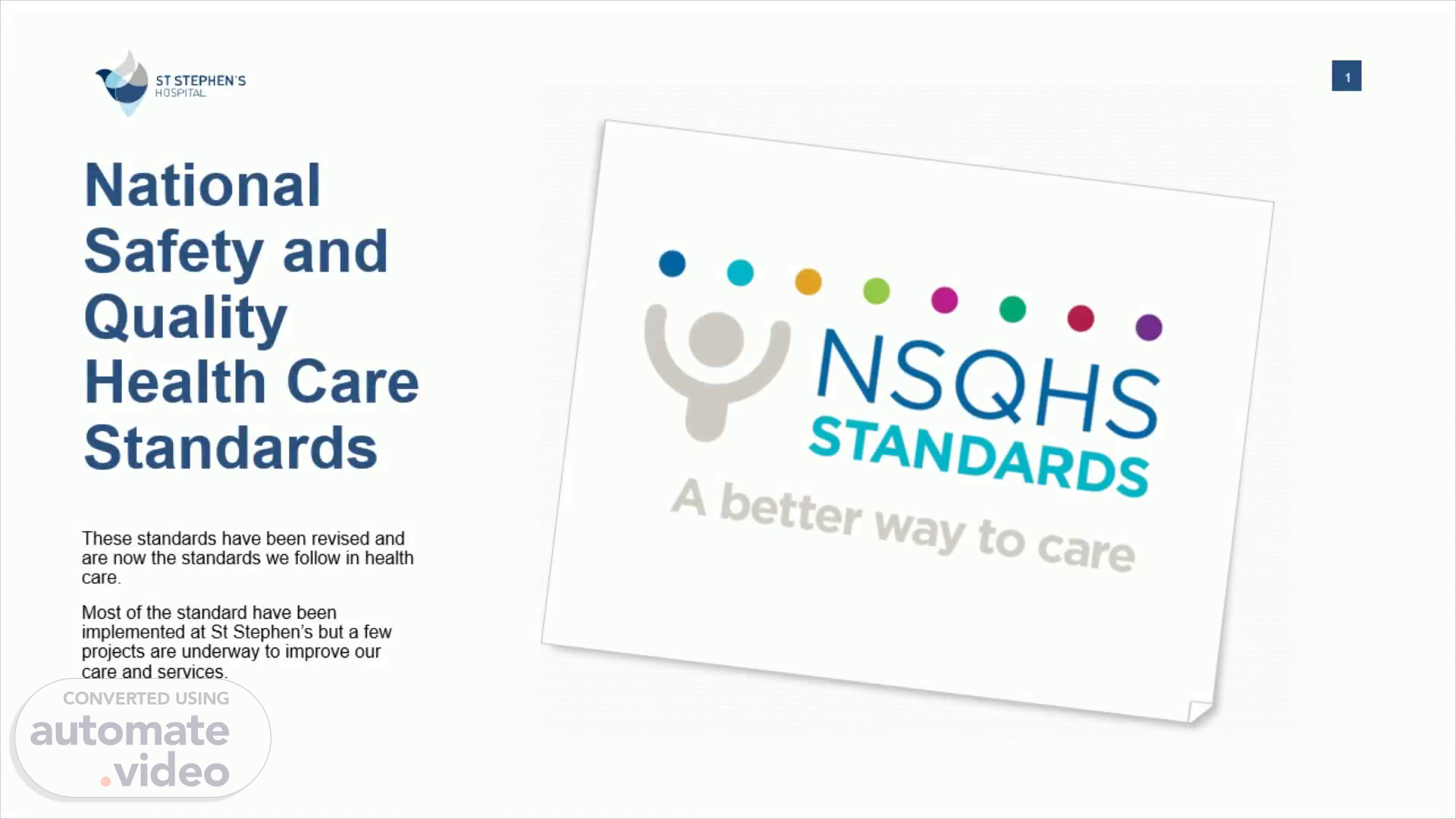
How to choose layout
Scene 1 (0s)
1. National Safety and Quality Health Care Standards.
Scene 2 (15s)
2. Standard 1 Clinical Governance. This standard aims to ensure that there are systems in place within health service organisations to maintain and improve the reliability, safety and quality of health care. At St Stephen’s this includes: Organisational Structure shows who reports to whom. Position descriptions make it clear what everyone’s roles are Committee Structure and Meetings to look at problems and issues and find solutions and improvement options. Policy, Procedures and Work Instruction show how ‘things’ should be done. Mandatory Training and Orientation to provide education improving our skills so we are safe in the workplace and provide excellent care and service..
Scene 3 (43s)
Hospital Acquired Conditions. 3.
Scene 4 (1m 4s)
4. Standard 2 Partnering with Consumers. The Partnering with Consumers Standard recognises the importance of involving patients in their own care and providing clear communication to patients. At St Stephen’s this includes: Consumer Advisory Committee & Consumers on other Committees make recommendations about planning design and delivery of care and services. Bed Side Handover includes patients and their families in their care planning. Patient communication boards keep patients and their families up to date with what is happening. Consumer feedback provides information about were improvement is needed or where a service is performing well..
Scene 5 (1m 29s)
What our patients say. 5.
Scene 6 (1m 50s)
Our Patient Experience Score. 6.
Scene 7 (2m 12s)
7. Standard 3 Healthcare – Associated Infection. The Preventing and Controlling Healthcare-Associated Infection Standard aims to improve infection prevention and control measures. At St Stephen’s this includes: Great hand hygiene by all staff to reduce the risk of infection. Standard precautions to protect ourselves against blood and body fluid exposures. Safe management of waste to make sure no one else is exposed to possible infections. Transmission based precautions to protect us from multi resistant organisms and decrease the risk of transfer of these organisms..
Scene 8 (2m 36s)
8. Hospital Acquired Infections. r-Jun 2019 Dui-sep 2019 Oct-Dec 2020 Jan-Mar 2020 Apr-Jun 2020.
Scene 9 (2m 57s)
Infection Prevention and Control Audit. 9. Audit Result Alston Ward McPhail Ward Ingram Ward 1 0.91 1.
Scene 10 (3m 18s)
10. Hand Hygiene Rate. St Stephen's Private Hospital (Org) 40 50 60 30 20 10 80 90 100 86.6% Total Moments: 447 Required Moments: 200.
Scene 11 (3m 39s)
11. Standard 4 Medication Safety. The Medication Safety Standard aims to ensure that clinicians safely prescribe, dispense and administer appropriate medicines, and monitor medicine use. At St Stephens this includes: Checking 7 Rights to ensure the right medication to the right patient at the right time. Bar Code Scanning of drugs and patient double checks patient and drug identification. Medication safety training and competencies to make sure everyone has the skills to safety administer medication. Electronic medication chart clear, legible orders available..
Scene 12 (4m 2s)
12. Medication Complications.
Scene 13 (4m 26s)
Medication Audit. 13. Audit Result Alston Ward McPhail Ward 1 1.
Scene 14 (4m 48s)
14. Standard 5 Comprehensive Care. The Comprehensive Care Standard aims to ensure that patients receive comprehensive health care that meets their individual needs, and considers the impact of their health issues on their life and wellbeing. At St Stephens this includes: Risk assessment identify patients at risk for falls, pressure injury, allergic reaction, malnutrition, dehydration and other high risk issues. Risk reduction strategies to reduce the risk of a hospital acquired complication. Comprehensive care planning to make sure the right care is given at the right time. End of life plan to ensure comprehensive end of life planning. More information on this will be available in March..
Scene 15 (5m 17s)
Falls in Hospital. 15. Hospital Quality Index Best Practice Worse than Peers Worst Practice.
Scene 16 (5m 38s)
Falls Audit. 16. Audit Result Alston Ward McPhail Ward Ingram 1 1 1.
Scene 17 (6m 0s)
Hospital Acquired Pressure Injuries. 17. Hospital Quality Index Best Practice Worse than Peers Worst Practice.
Scene 18 (6m 20s)
Pressure Injury Audit. 18. Audit Result Alston Ward McPhail Ward 1 1.
Scene 19 (6m 41s)
19. Risk assessment on admission Nutrition deficient care plan for ‘at risk patients’ Dietitian review if ‘at risk’ Food chart for high risk patients.
Scene 20 (7m 2s)
20. Hospital Acquired Malnutrition. Hospital Quality Index Best Practice Worse than Peers Worst Practice.
Scene 21 (7m 23s)
21. Hospital Acquired Delirium. Hospital Quality Index Best Practice Worse than Peers Worst Practice.
Scene 22 (7m 44s)
22. Fact Sheets for loved ones Sunflower to help communication Personalised Plan of Care TOP 5 person centred strategies.